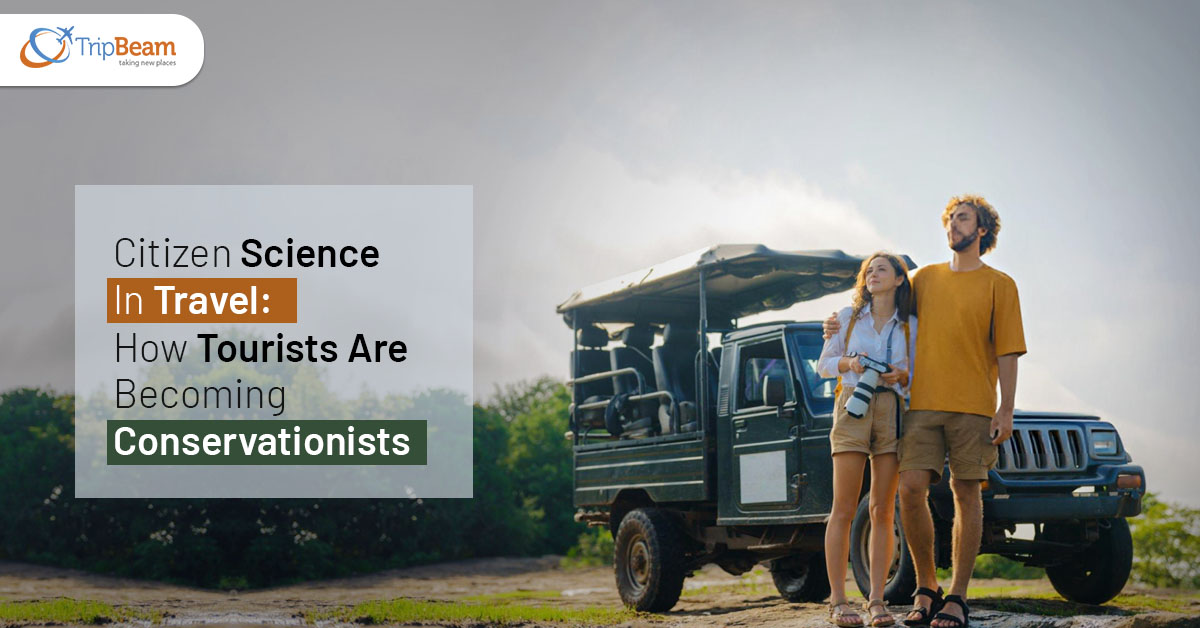

Tripbeam is conscious of the role tourists are playing by becoming conservationists. This is not just another trend where people show off preserving the ecosystem on the internet. It is as real as it gets! Digital tech connects us to the world and this is fueling the new wake. Tourists can now participate actively in scientific research. This movement is called citizen science. And we’re here to tell you everything about it before you get last minute flights from Canada to India with us!
Nowadays, everyone is eager to participate in healing the planet. The days where scientists were solely responsible for fixing what’s wrong with Earth are long gone. Vivek Menon, the co – founder of Wildlife Trust of India, Councillor IUCN, Steering Committee Species Survival Commission IUCN, shared his thoughts with Times Travel.
According to him, “the age – old practice of only trained scientists contributing to science is long gone. Even in those days, amateur naturalists contributed to taxonomy and the discovery of species.” Adding further to that statement, “today, the interested naturalist, especially the perennial traveller, can contribute to citizen science by documenting all that they see around them and uploading photos and notes onto sites like iNaturalist or eBird,” he said.
As you can infer by the name, citizen science is where regular people (like you and me) can contribute to scientific research and collection of data. The public is involved on a deeper level than before. Since we live in a world where social media prevails, everyone knows about a collaboration. And this is the kind of collab the world needs right now. Before you get online cheap tickets to India from Canada with us, here’s the technical definition of citizen science.
To speak technically, citizen science is a collaborative effort where everyday people (often without formal scientific training) collect data by observing their environment. They then share this information with professional researchers through nature – related websites and apps.
As said by Kedar Gore in his own words, “With more and more people exploring the wilderness regularly, natural history observations made through citizen science can play a valuable role in systematic documentation of biodiversity. eBird is one of the finest examples of citizen science contributing information on the occurrence of birds, especially migratory species.
Websites allow users to upload observations of plants, amphibians, insects, spiders, fungi, and other taxa, where experts help identify them. With smartphones, participation in citizen science programmes is much easier.
And guess what, the data collected is then used by scientists for research, conservation planning, and monitoring species.”
With people of the world coming together to contribute to citizen science, it is undoubtedly one of the most crucial things the world needs right now. People have long been playing the blame game and now, they finally have the chance to give back to the environment. They don’t even need a fancy degree or costly equipment either. Just curiosity. So, before you check out our cheap flights from Alberta to India, ensure you see if you can become a part of this movement. Save the environment. Save yourself.
Also Read: Diplomatic Tensions Escalate: India Tells Canada to Remove 41 of Its 62 Diplomats
Tell us more details to help better






| Sun | Mon | Tue | Wed | Thu | Fri | Sat |
|---|---|---|---|---|---|---|
30 | 31 | 1 | 2 | 3 | 4 | 5 |
6 | 7 | 8 | 9 | 10 | 11 | 12 |
13 | 14 | 15 | 16 | 17 | 18 | 19 |
20 | 21 | 22 | 23 | 24 | 25 | 26 |
27 | 28 | 29 | 30 | 1 | 2 | 3 |
| Sun | Mon | Tue | Wed | Thu | Fri | Sat |
|---|---|---|---|---|---|---|
30 | 31 | 1 | 2 | 3 | 4 | 5 |
6 | 7 | 8 | 9 | 10 | 11 | 12 |
13 | 14 | 15 | 16 | 17 | 18 | 19 |
20 | 21 | 22 | 23 | 24 | 25 | 26 |
27 | 28 | 29 | 30 | 1 | 2 | 3 |